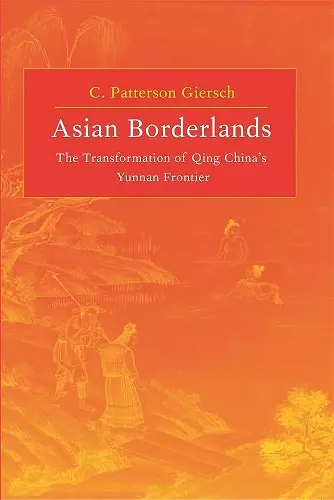Asian Borderlands
The Transformation of Qing China's Yunnan Frontier
Format:Hardback
Publisher:Harvard University Press
Published:14th Jun '06
Currently unavailable, and unfortunately no date known when it will be back

This book begins to fill in a 'black hole' in Chinese history with a critical examination of the history of Chinese expansion into and colonization of the southwest. It is the first study that even attempts to place the indigenous Tai peoples at the center of the story, analyzing how they lived before the Chinese state arrived and how they reacted to the Chinese colonial project. Future research on China's frontiers will be measured against it precisely because Giersch presents the Yunnan frontier in its totality. This original contribution advances our conceptual approach to China's frontiers, casting an illuminating light on the fascinating history of the southwest. -- John Herman, Virginia Commonwealth University In a superb study of the expansion of the Qing empire on its southwestern frontier, C. Patterson Giersch elegantly describes how the Qing rulers first conquered and then penetrated southern Yunnan. He does not see Qing integration of this region as an inevitable, smooth process, but instead emphasizes the contests between multiple players from many different states and ethnic groups as they battled for military, economic, and cultural influence. This work should attract the interest of scholars of many other frontiers, as well. Giersch shows how Qing policies reflected and differed from the practices of Southeast Asian and European imperial states, and how this region of the empire constantly kept in touch with global movements of people, commodities, and capital. He very effectively puts China in the wider world. -- Peter C. Perdue, MIT, author of China Marches West: The Qing Conquest of Central Eurasia
With comparative frontier history and pioneering use of indigenous sources, Giersch provides a groundbreaking challenge to the China-centered narrative of the Qing conquest. He focuses on the Tai domains of the Yunnan frontier on the politically fluid borderlands, where local, indigenous leaders were crucial actors in an arena of imperial rivalry.
C. Patterson Giersch provides a groundbreaking challenge to the China-centered narrative of the Qing conquest through comparative frontier history and a pioneering use of indigenous sources. He focuses on the Tai domains of China's Yunnan frontier, part of the politically fluid borderlands, where local, indigenous leaders were crucial actors in an arena of imperial rivalry.
Patterns of acculturation were multi-directional. Both Qing and Tai created a hybrid frontier government that was tested as Burma and Siam extended influence into the region. As Qing and Chinese migrants gained greater political and economic control in borderland communities, indigenes adopted select Chinese ways. Chinese language was useful for trade, and relations with imperial officials were eased by wearing the queue and donning imperial robes. But indigenous culture and livelihoods persisted, and Tai aristocrats adopted rituals and symbols of the Burmese and Siamese courts.
Qing conquest and Chinese migration did not lead to simple patterns of incorporation and assimilation. Chinese economic and cultural influences were profound, but did not entirely undermine indigenous practices. These legacies, which would shape and complicate twentieth-century Chinese state building, hold an important key to understanding modern China.
This book begins to fill in a 'black hole' in Chinese history with a critical examination of the history of Chinese expansion into and colonization of the southwest. It is the first study that even attempts to place the indigenous Tai peoples at the center of the story, analyzing how they lived before the Chinese state arrived and how they reacted to the Chinese colonial project. Future research on China's frontiers will be measured against it precisely because Giersch presents the Yunnan frontier in its totality. This original contribution advances our conceptual approach to China's frontiers, casting an illuminating light on the fascinating history of the southwest. -- John Herman, Virginia Commonwealth University
In a superb study of the expansion of the Qing empire on its southwestern frontier, C. Patterson Giersch elegantly describes how the Qing rulers first conquered and then penetrated southern Yunnan. He does not see Qing integration of this region as an inevitable, smooth process, but instead emphasizes the contests between multiple players from many different states and ethnic groups as they battled for military, economic, and cultural influence. This work should attract the interest of scholars of many other frontiers, as well. Giersch shows how Qing policies reflected and differed from the practices of Southeast Asian and European imperial states, and how this region of the empire constantly kept in touch with global movements of people, commodities, and capital. He very effectively puts China in the wider world. -- Peter C. Perdue, MIT, author of China Marches West: The Qing Conquest of Central Eurasia
- Nominated for Joseph Levenson Book Prize 2008
- Nominated for John K. Fairbank Prize in East Asian History 2007
- Nominated for Harry J. Benda Prize 2008
ISBN: 9780674021716
Dimensions: unknown
Weight: unknown
328 pages